Finding purpose through adversity and connection
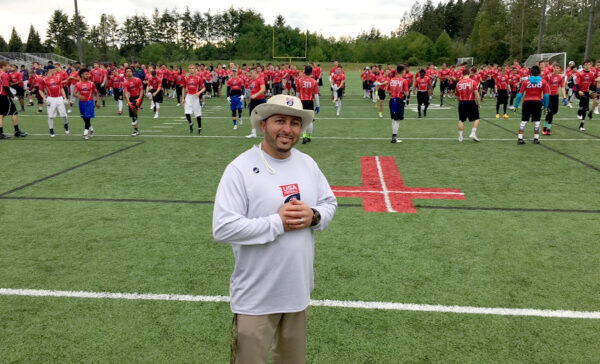
There was a point in Hector Valencia’s life when he never intended to finish college. After serving in the Marine Corps straight from high school, he secured a job as a journeyman carpenter and became a member of a local carpentry union. He said the opportunity put his life on a whole new trajectory.
Not long after though, a near-death accident sent his life in another direction, eventually leading to a renewed love of coaching and a Society, Ethics & Human Behavior degree from the School of Interdisciplinary Arts & Sciences at the University of Washington Bothell.
Signing up for a life of service
Growing up in the ’80s, Valencia was the eldest child in a family of five children. As a boy, he loved action stars like Sylvester Stallone and Arnold Schwarzenegger — and watching their movies made him dream of joining the U.S. Army.
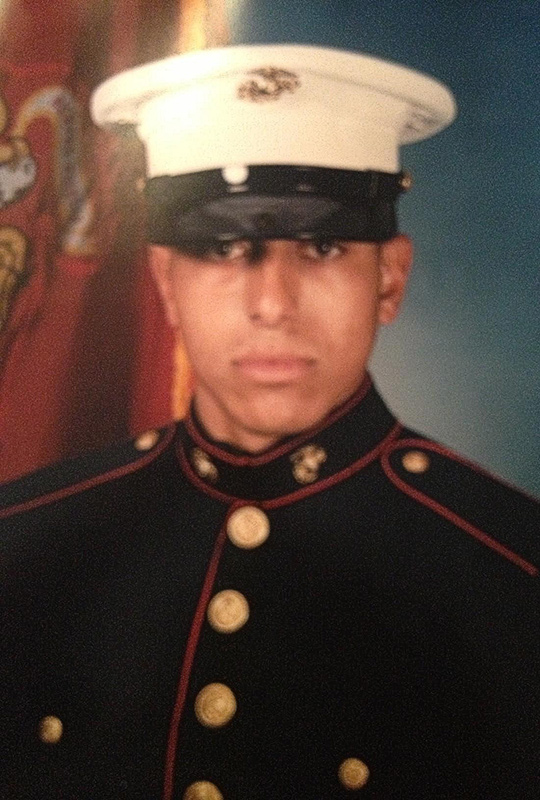
But then a friend in high school told Valencia that the Marine Corps was a better choice because “the Marines are number one.” Valencia said he didn’t question it. “I just wanted to serve, and if the Marines were number one, why would I go anywhere else?”
Valencia enlisted in the Marines in late 1999 during a time when the U.S.A wasn’t involved in any major conflicts. Partway through his four years of service, however, the 9/11 terrorist attacks led to his deployment to the Western Pacific, then later to Iraq.
Toward the end of his time in the military, Valencia was one of the first Marines to enter Iraq from the Kuwait border at the beginning of the Second Gulf War. After one tour, he came home, his service ended, and he tried to figure out his next steps.
“When I was growing up, my dad was a landscaper and then in construction,” Valencia said. “So, when I came home, I got a job in construction as a laborer and started to use my GI Bill part-time to go to community college.”
Finding a new career
Within a couple of years, Valencia was offered the opportunity to join a local union as a journeyman carpenter. “Pay-wise and benefits-wise, at that age, that was life changing,” he said. “It was a great opportunity, making great money, and there was potential to move into management sometime in the future.”
Valencia left college, never intending to return as he had a career in carpentry ahead of him. A year later, however, disaster struck. While working on a job, Valencia fell off some scaffolding, hitting his head.
Three weeks later, he woke up in the hospital from a coma. He was told he’d had a traumatic brain injury and was lucky to be alive. The entire right side of his skull had been removed to ease the swelling in his brain, and he wore a helmet for six months while he recovered, before surgeons rebuilt his skull with four metal plates.
There was one silver lining to Valencia’s accident, he said. A week or so beforehand, he had started dating his now-wife, Mariela. When she didn’t hear from him for a while she tried calling him, only to have Valencia’s brother answer the phone and inform her of the situation. “I don’t know how many days I was in that coma,” Valencia said, “but she was there every day, and she’s been with me ever since.”
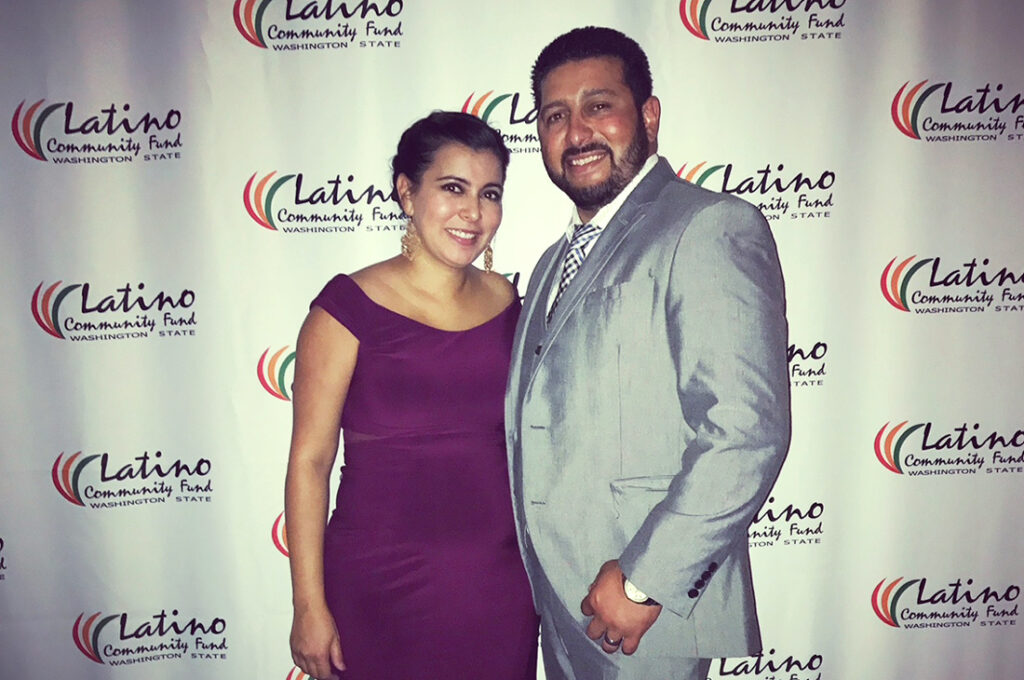
Going back to college
After the accident, Valencia couldn’t work so he decided to go back to community college. “I was doing all this therapy for my body, and I was thinking, ‘I need therapy for my head. I need to go back to school and finish.’”
“I was doing all this therapy for my body, and in my mind, I was like, you know what? I need therapy for my head. I need to go back to school and finish.”
Hector Valencia
Since he couldn’t drive after his injury, Valencia started to take public transportation to Bellevue Community College. Later, he transferred to UW Bothell into the Society, Ethics & Human Behavior major within the School of Interdisciplinary Arts & Sciences. He said the human behavior aspect caught his attention due to some personality issues he was having at the time because of his time in the Marine Corps and due to his traumatic brain injury.
His experience outside of the classroom also had a huge impact: The very day he was accepted into UW Bothell, Valencia went to the football practice fields at the UW in Seattle, hoping to get involved with the team.
He ran into some equipment managers, and when he asked them if he could get involved, they asked if he was a student. Valencia said he responded proudly, “Yes, I am.” Not long afterward, he was an equipment manager himself, working alongside office line coach Dan Cozzetto.
Becoming Coach Valencia
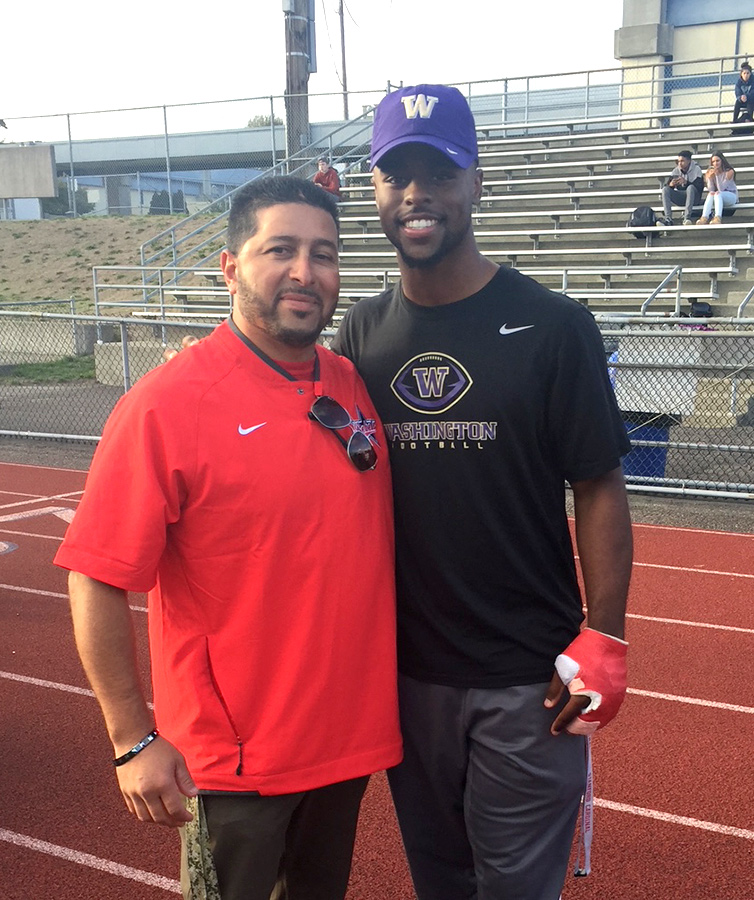
For the next two years, Valencia attended early morning practices with the Huskies football team before traveling to UW Bothell for his classes. By that time, Valencia was 30 years old, and he was surrounded by young freshmen and sophomores on the football team. Due to his age and his natural inclination for leadership, a lot of the student athletes approached Valencia as a coach. On his first day, a player, Deontae Cooper, asked for his last name and immediately started calling him Coach Valencia. “I saw myself as a coach from then on, and I never looked back,” he said.
The experience brought out a passion for mentorship in Valencia that began when he was young, acting as a role model for his siblings, and was further developed when he worked as a martial arts instructor and squad leader in the Marines.
In his classes, Valencia also reflected on his experience as a young person in the Marines and on how transformational it was. He realized that young people often needed role models and mentors during their earlier years of mature development.
“Let’s say two young people are growing up in the same environment. One turns out okay, and the other one doesn’t,” he said. “What was that X factor? Sometimes it’s nothing more than a coach, a mentor or a role model, sometimes a teacher. That’s part of what led me to keep coaching.”
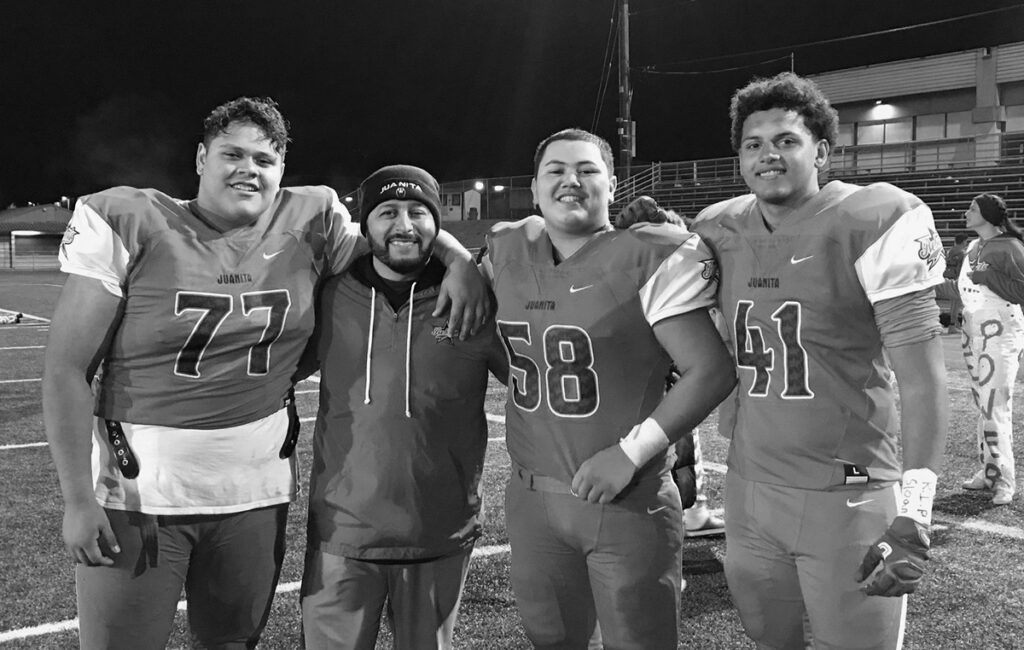
“What was that X factor? Sometimes it’s nothing more than a coach, a mentor or a role model.”
Hector Valencia
Valencia continued to serve as a coach for years after graduating, working with football teams in the North Puget Sound region, including high school teams at Juanita, Meadowdale and Cascade.
Growing in the classroom
After completing his college degree, Valencia started to recover more physically, so he went back to being a journeyman carpenter. He credits higher educations with helping him to look at people and situations from different perspectives. He said his studies have made him more well-rounded — and his ability to work with computers and write well are essential to his career.
Valencia said his writing skills improved while at UW Bothell, with the catalyst being a public speaking class. “I took a speech class, and the instructor was amazing. Her style spoke to me. She was very dramatic and really painted a picture with her words.”
Through the course, Valencia learned how to write effective papers. Afterward, he said he looked at old essays and could see how bad his writing had been. “These 18-year-old kids were getting much better grades than I was,” he said. “Once I took that class though, it really helped me out.”
A class from the course is still lodged in Valencia’s memory: The professor was speaking about a case study where police officers weren’t wearing their seatbelts, with many saying that if there was an accident, they could just put their hands out to stop themselves from getting hurt.
The professor demonstrated how the officers were convinced to change their minds. They were told to hold their arms out in front of them and to run into a wall — something the professor then did herself for the class.
“That was her teaching style, and it spoke to me,” Valencia said.
Settling into a life of mentorship
Today, Valencia is still in the construction industry, working as a superintendent on projects in Seattle and Tacoma. His approach remains rooted in mentorship.
“I can’t get away from it,” he laughed. “With the younger guys I work with, I’m always in coaching mode. I try to give them the kind of help I wish I had when I was coming up.”
Outside his career, Valencia has stepped away from football coaching to focus on raising his three young children, but his commitment to mentorship hasn’t waned. He said he wants to continue supporting his family, extended family and community by offering guidance and support wherever he can.
“If I can’t coach a team, I can still be there for my cousins, my nieces and nephews,” he said. “I want to make sure I’m helping my own family, too.”
Valencia also said he still lives by a quote he learned during his public speaking class at UW Bothell — something that describes the course of his life so far.
“We only change when the pain of staying the same is greater than the pain of change.”